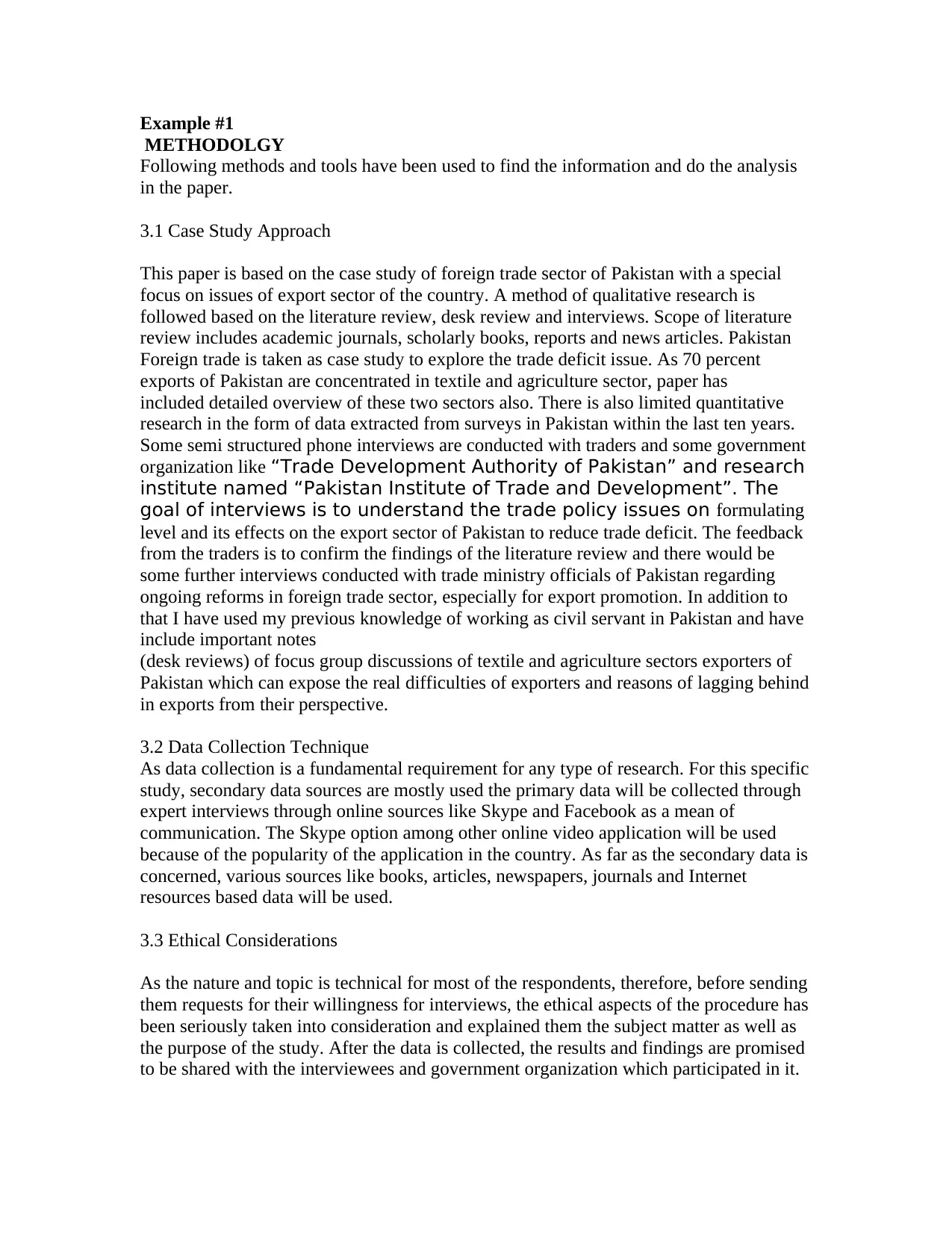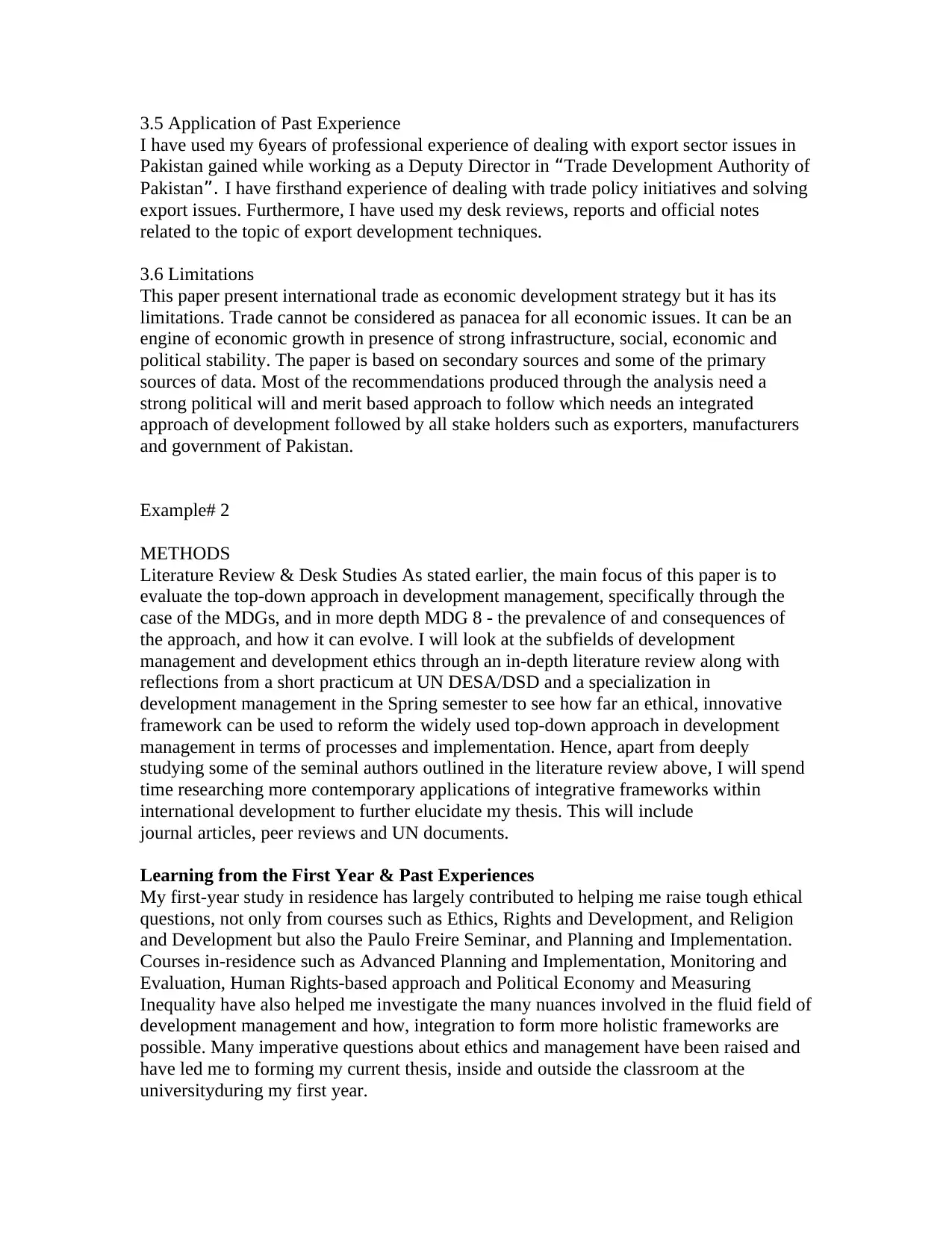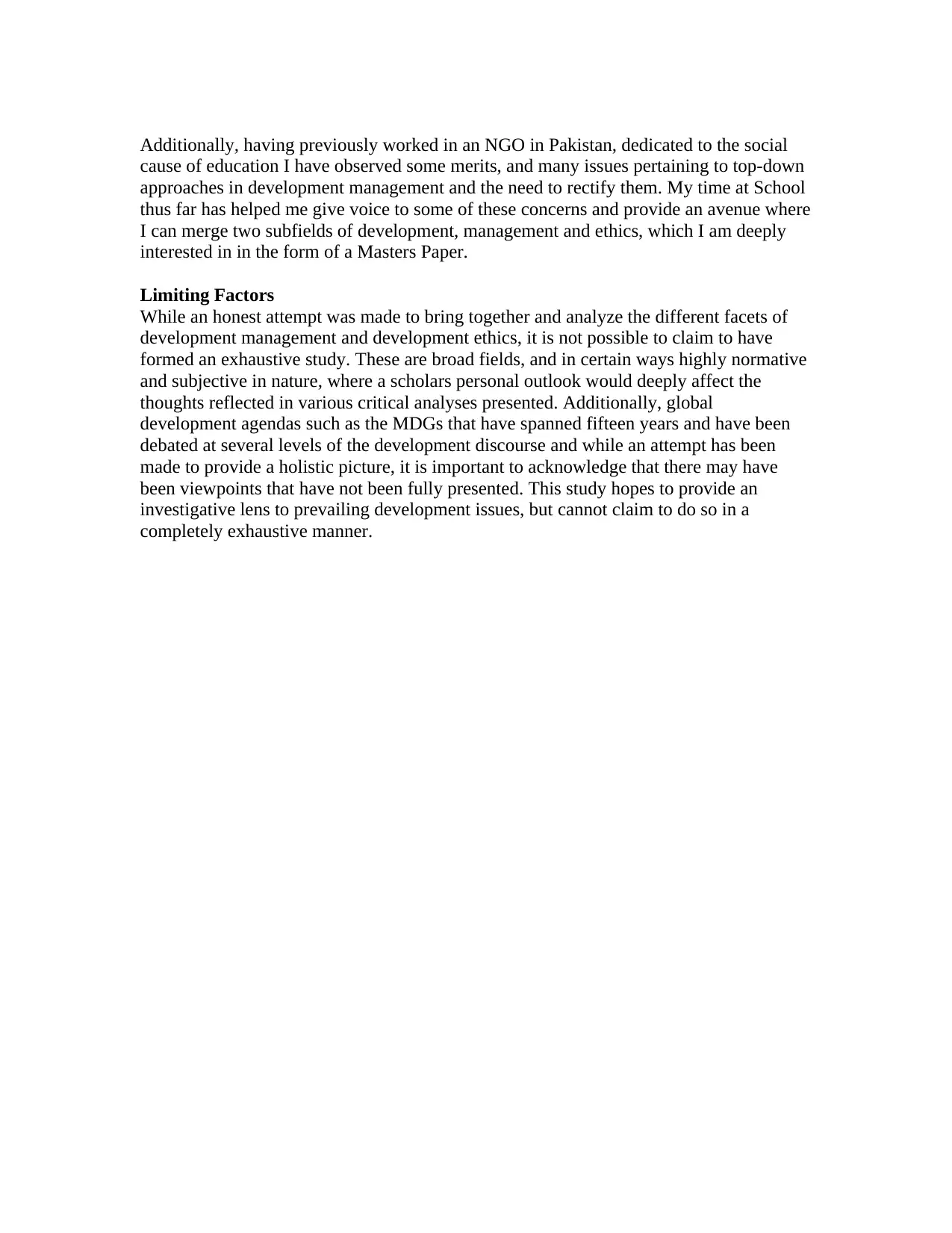Analyzing Pakistan's Foreign Trade: Research Methodology and Findings
VerifiedAdded on 2019/09/30
|3
|1220
|177
Report
AI Summary
This report outlines the research methodologies employed in analyzing Pakistan's foreign trade, with a specific focus on the export sector and trade deficit. The study utilizes a case study approach, examining Pakistan's foreign trade with an emphasis on the textile and agriculture sectors, which constitute a significant portion of the country's exports. The methodology includes a comprehensive literature review, desk reviews, and interviews with traders, government officials from the Trade Development Authority of Pakistan, and researchers from the Pakistan Institute of Trade and Development. Data collection techniques involve secondary data from various sources and primary data through expert interviews. The report also addresses ethical considerations and the application of the author's professional experience in the field. The study acknowledges limitations, such as the reliance on secondary data and the need for strong political will to implement recommendations, while aiming to provide a comprehensive understanding of the complexities of Pakistan's foreign trade and potential solutions to its trade deficit.

Example #1
METHODOLGY
Following methods and tools have been used to find the information and do the analysis
in the paper.
3.1 Case Study Approach
This paper is based on the case study of foreign trade sector of Pakistan with a special
focus on issues of export sector of the country. A method of qualitative research is
followed based on the literature review, desk review and interviews. Scope of literature
review includes academic journals, scholarly books, reports and news articles. Pakistan
Foreign trade is taken as case study to explore the trade deficit issue. As 70 percent
exports of Pakistan are concentrated in textile and agriculture sector, paper has
included detailed overview of these two sectors also. There is also limited quantitative
research in the form of data extracted from surveys in Pakistan within the last ten years.
Some semi structured phone interviews are conducted with traders and some government
organization like “Trade Development Authority of Pakistan” and research
institute named “Pakistan Institute of Trade and Development”. The
goal of interviews is to understand the trade policy issues on formulating
level and its effects on the export sector of Pakistan to reduce trade deficit. The feedback
from the traders is to confirm the findings of the literature review and there would be
some further interviews conducted with trade ministry officials of Pakistan regarding
ongoing reforms in foreign trade sector, especially for export promotion. In addition to
that I have used my previous knowledge of working as civil servant in Pakistan and have
include important notes
(desk reviews) of focus group discussions of textile and agriculture sectors exporters of
Pakistan which can expose the real difficulties of exporters and reasons of lagging behind
in exports from their perspective.
3.2 Data Collection Technique
As data collection is a fundamental requirement for any type of research. For this specific
study, secondary data sources are mostly used the primary data will be collected through
expert interviews through online sources like Skype and Facebook as a mean of
communication. The Skype option among other online video application will be used
because of the popularity of the application in the country. As far as the secondary data is
concerned, various sources like books, articles, newspapers, journals and Internet
resources based data will be used.
3.3 Ethical Considerations
As the nature and topic is technical for most of the respondents, therefore, before sending
them requests for their willingness for interviews, the ethical aspects of the procedure has
been seriously taken into consideration and explained them the subject matter as well as
the purpose of the study. After the data is collected, the results and findings are promised
to be shared with the interviewees and government organization which participated in it.
METHODOLGY
Following methods and tools have been used to find the information and do the analysis
in the paper.
3.1 Case Study Approach
This paper is based on the case study of foreign trade sector of Pakistan with a special
focus on issues of export sector of the country. A method of qualitative research is
followed based on the literature review, desk review and interviews. Scope of literature
review includes academic journals, scholarly books, reports and news articles. Pakistan
Foreign trade is taken as case study to explore the trade deficit issue. As 70 percent
exports of Pakistan are concentrated in textile and agriculture sector, paper has
included detailed overview of these two sectors also. There is also limited quantitative
research in the form of data extracted from surveys in Pakistan within the last ten years.
Some semi structured phone interviews are conducted with traders and some government
organization like “Trade Development Authority of Pakistan” and research
institute named “Pakistan Institute of Trade and Development”. The
goal of interviews is to understand the trade policy issues on formulating
level and its effects on the export sector of Pakistan to reduce trade deficit. The feedback
from the traders is to confirm the findings of the literature review and there would be
some further interviews conducted with trade ministry officials of Pakistan regarding
ongoing reforms in foreign trade sector, especially for export promotion. In addition to
that I have used my previous knowledge of working as civil servant in Pakistan and have
include important notes
(desk reviews) of focus group discussions of textile and agriculture sectors exporters of
Pakistan which can expose the real difficulties of exporters and reasons of lagging behind
in exports from their perspective.
3.2 Data Collection Technique
As data collection is a fundamental requirement for any type of research. For this specific
study, secondary data sources are mostly used the primary data will be collected through
expert interviews through online sources like Skype and Facebook as a mean of
communication. The Skype option among other online video application will be used
because of the popularity of the application in the country. As far as the secondary data is
concerned, various sources like books, articles, newspapers, journals and Internet
resources based data will be used.
3.3 Ethical Considerations
As the nature and topic is technical for most of the respondents, therefore, before sending
them requests for their willingness for interviews, the ethical aspects of the procedure has
been seriously taken into consideration and explained them the subject matter as well as
the purpose of the study. After the data is collected, the results and findings are promised
to be shared with the interviewees and government organization which participated in it.
Paraphrase This Document
Need a fresh take? Get an instant paraphrase of this document with our AI Paraphraser

3.5 Application of Past Experience
I have used my 6years of professional experience of dealing with export sector issues in
Pakistan gained while working as a Deputy Director in “Trade Development Authority of
Pakistan”. I have firsthand experience of dealing with trade policy initiatives and solving
export issues. Furthermore, I have used my desk reviews, reports and official notes
related to the topic of export development techniques.
3.6 Limitations
This paper present international trade as economic development strategy but it has its
limitations. Trade cannot be considered as panacea for all economic issues. It can be an
engine of economic growth in presence of strong infrastructure, social, economic and
political stability. The paper is based on secondary sources and some of the primary
sources of data. Most of the recommendations produced through the analysis need a
strong political will and merit based approach to follow which needs an integrated
approach of development followed by all stake holders such as exporters, manufacturers
and government of Pakistan.
Example# 2
METHODS
Literature Review & Desk Studies As stated earlier, the main focus of this paper is to
evaluate the top-down approach in development management, specifically through the
case of the MDGs, and in more depth MDG 8 - the prevalence of and consequences of
the approach, and how it can evolve. I will look at the subfields of development
management and development ethics through an in-depth literature review along with
reflections from a short practicum at UN DESA/DSD and a specialization in
development management in the Spring semester to see how far an ethical, innovative
framework can be used to reform the widely used top-down approach in development
management in terms of processes and implementation. Hence, apart from deeply
studying some of the seminal authors outlined in the literature review above, I will spend
time researching more contemporary applications of integrative frameworks within
international development to further elucidate my thesis. This will include
journal articles, peer reviews and UN documents.
Learning from the First Year & Past Experiences
My first-year study in residence has largely contributed to helping me raise tough ethical
questions, not only from courses such as Ethics, Rights and Development, and Religion
and Development but also the Paulo Freire Seminar, and Planning and Implementation.
Courses in-residence such as Advanced Planning and Implementation, Monitoring and
Evaluation, Human Rights-based approach and Political Economy and Measuring
Inequality have also helped me investigate the many nuances involved in the fluid field of
development management and how, integration to form more holistic frameworks are
possible. Many imperative questions about ethics and management have been raised and
have led me to forming my current thesis, inside and outside the classroom at the
universityduring my first year.
I have used my 6years of professional experience of dealing with export sector issues in
Pakistan gained while working as a Deputy Director in “Trade Development Authority of
Pakistan”. I have firsthand experience of dealing with trade policy initiatives and solving
export issues. Furthermore, I have used my desk reviews, reports and official notes
related to the topic of export development techniques.
3.6 Limitations
This paper present international trade as economic development strategy but it has its
limitations. Trade cannot be considered as panacea for all economic issues. It can be an
engine of economic growth in presence of strong infrastructure, social, economic and
political stability. The paper is based on secondary sources and some of the primary
sources of data. Most of the recommendations produced through the analysis need a
strong political will and merit based approach to follow which needs an integrated
approach of development followed by all stake holders such as exporters, manufacturers
and government of Pakistan.
Example# 2
METHODS
Literature Review & Desk Studies As stated earlier, the main focus of this paper is to
evaluate the top-down approach in development management, specifically through the
case of the MDGs, and in more depth MDG 8 - the prevalence of and consequences of
the approach, and how it can evolve. I will look at the subfields of development
management and development ethics through an in-depth literature review along with
reflections from a short practicum at UN DESA/DSD and a specialization in
development management in the Spring semester to see how far an ethical, innovative
framework can be used to reform the widely used top-down approach in development
management in terms of processes and implementation. Hence, apart from deeply
studying some of the seminal authors outlined in the literature review above, I will spend
time researching more contemporary applications of integrative frameworks within
international development to further elucidate my thesis. This will include
journal articles, peer reviews and UN documents.
Learning from the First Year & Past Experiences
My first-year study in residence has largely contributed to helping me raise tough ethical
questions, not only from courses such as Ethics, Rights and Development, and Religion
and Development but also the Paulo Freire Seminar, and Planning and Implementation.
Courses in-residence such as Advanced Planning and Implementation, Monitoring and
Evaluation, Human Rights-based approach and Political Economy and Measuring
Inequality have also helped me investigate the many nuances involved in the fluid field of
development management and how, integration to form more holistic frameworks are
possible. Many imperative questions about ethics and management have been raised and
have led me to forming my current thesis, inside and outside the classroom at the
universityduring my first year.

Additionally, having previously worked in an NGO in Pakistan, dedicated to the social
cause of education I have observed some merits, and many issues pertaining to top-down
approaches in development management and the need to rectify them. My time at School
thus far has helped me give voice to some of these concerns and provide an avenue where
I can merge two subfields of development, management and ethics, which I am deeply
interested in in the form of a Masters Paper.
Limiting Factors
While an honest attempt was made to bring together and analyze the different facets of
development management and development ethics, it is not possible to claim to have
formed an exhaustive study. These are broad fields, and in certain ways highly normative
and subjective in nature, where a scholars personal outlook would deeply affect the
thoughts reflected in various critical analyses presented. Additionally, global
development agendas such as the MDGs that have spanned fifteen years and have been
debated at several levels of the development discourse and while an attempt has been
made to provide a holistic picture, it is important to acknowledge that there may have
been viewpoints that have not been fully presented. This study hopes to provide an
investigative lens to prevailing development issues, but cannot claim to do so in a
completely exhaustive manner.
cause of education I have observed some merits, and many issues pertaining to top-down
approaches in development management and the need to rectify them. My time at School
thus far has helped me give voice to some of these concerns and provide an avenue where
I can merge two subfields of development, management and ethics, which I am deeply
interested in in the form of a Masters Paper.
Limiting Factors
While an honest attempt was made to bring together and analyze the different facets of
development management and development ethics, it is not possible to claim to have
formed an exhaustive study. These are broad fields, and in certain ways highly normative
and subjective in nature, where a scholars personal outlook would deeply affect the
thoughts reflected in various critical analyses presented. Additionally, global
development agendas such as the MDGs that have spanned fifteen years and have been
debated at several levels of the development discourse and while an attempt has been
made to provide a holistic picture, it is important to acknowledge that there may have
been viewpoints that have not been fully presented. This study hopes to provide an
investigative lens to prevailing development issues, but cannot claim to do so in a
completely exhaustive manner.
⊘ This is a preview!⊘
Do you want full access?
Subscribe today to unlock all pages.

Trusted by 1+ million students worldwide
1 out of 3
Related Documents
Your All-in-One AI-Powered Toolkit for Academic Success.
+13062052269
info@desklib.com
Available 24*7 on WhatsApp / Email
![[object Object]](/_next/static/media/star-bottom.7253800d.svg)
Unlock your academic potential
Copyright © 2020–2026 A2Z Services. All Rights Reserved. Developed and managed by ZUCOL.





